“Human decency is not derived from religion. It precedes it.” — Christopher Hitchens, God Is Not Great
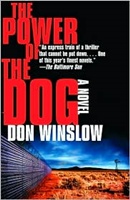 |
The Power of the Dog, by Don Winslow This is a big novel, epic in scope, The Grapes of Wrath of the Mexican drug empire and America’s halfhearted fight against it. The Power of the Dog is a novelized history of the rise of Mexico’s drug cartels and the consequent corruption of its society, government, and law enforcement; the involvement of American organized crime families in the drug trade; the look-the-other-way policies of American government and military leaders seeking to preserve the business-friendly status quo in Mexico and Central America; and not least the corruption and bureaucratic infighting that make US drug-fighting agencies so ineffective. As far as I can tell, the history and events described in the novel are factual. The fictional overlay consists of made-up characters — Mexican drug cartel leaders, American DEA agents, a Mexican cardinal, American mafiosi, and other supporting characters — who live and tell the story, giving it immediacy and interest. The author, through the thoughts of these characters, moralizes and editorializes throughout, which I thought detracted from the story. The story itself — the staggering levels of criminality, barbarity, and corruption — stands on its own and doesn’t need the author’s moralizing. That was my only objection to The Power of the Dog. This is a good read, and an important one, but if it’s the only book you’re going to read about the Mexican drug cartel, it’s kind of like choosing to read James Michener’s novel Space, a fictionalized history of the US space program, when you could have read Tom Wolfe’s brilliant non-fiction history, The Right Stuff. If you’re really interested in this subject, you should read the non-fictional reportage of Charles Bowden (Murder City: Ciudad Juarez and the Global Economy’s New Killing Fields — reviewed below). |
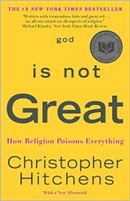 |
God Is Not Great: How Religion Poisons Everything, by Christopher Hitchens Dawkins’ The God Delusion hit me as an emotionless recitation of the same reasons not to believe in god I’d come up with on my own at the age of 13, albeit expressed in more sophisticated ways. I wanted more. Hitchens delivers. There is emotion here, and rage, wittily and convincingly expressed. Hitchens examines not only the inherent falsity of religion, but the evils perpetrated by religion throughout history. He holds religion up against humanism, clearly showing that mankinds’ better impulses and achievements come from the latter, not the former, which has historically worked hand in hand with the most infamous dictators and tyrants to subjugate people (and continues to do so today). Hitchens expresses the joy, excitement, and sense of reverence open-minded and intelligent people derive from scientific discovery and our increasing knowledge of the physical world and universe, presenting knowledge as the true “word of god,” the goal we should be pursuing. So this is not only a book containing the usual arguments against god and religion, but a book of inspiration and hope, an affirmation, if you will, of faith in man, not god. |
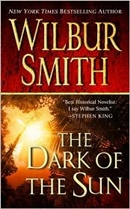 |
The Dark of the Sun, by Wilbur Smith Wilbur Smith is an international best-selling writer of adventure and intrigue potboilers set in contemporary and historical times. This was my first exposure to his writing. Smith, at least in this early novel, comes across as a man of his time and place, with notions and prejudices shaped by his upbringing in white-ruled apartheid Rhodesia. The Dark of the Sun, published in 1965, was his second novel (he’s now up to 33). The first 50 pages of this 282-page paperback contain the following echoes of times past: – ‘Jesus!’ growled Wally Hendry from the bed. ‘I’ve had just about a gutsful of this nigger army.’ (page 1) – ‘After three months of fighting a bunch of greasy little Gurkhas I was looking forward to a bit of fun . . . ‘ (page 2) – ‘Shut up, damn you,’ Bruce roared and swung his open hand against the head of the gendarme beside him, but the man hardly noticed it. His eyes were glazing with the infectious hysteria to which the African is so susceptible; he had snatched up his rifle and was holding it across his chest; already his body was beginning to jerk convulsively as he chanted. (page 25) This is a Great White Hunter burger (with a supersized side of Mau-Mau booga-booga). Perhaps Smith’s later novels are more enlightened. If the friend who loaned me this one loans me a newer one, I’ll give it a go. The man does write a ripping yarn. |
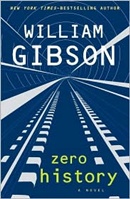 |
Zero History, by William Gibson Huburtus Bigend is back. Actually several characters are back, along with some fresh faces, tearing around London and Paris on Bigend’s dime, trying to find a secretive anti-marketer. Of denim jeans. If you think this doesn’t make sense, or that it doesn’t sound interesting, you have obviously not read William Gibson. Because it does make sense, and it’s compellingly interesting. The characters, once again, are people you happily come to know. The plot is complex, the action suspenseful; the ideas grand. And Gibson, as I mentioned in my review of the very first novel of his I read, has a way of introducing multiple loose ends, weaving them in and around the story, then wrapping them up at the end in a most satisfactory manner. As with Margaret Atwood, Patrick O’Brian, or David Mitchell, when you finish a Gibson novel you want to go back and read the previous ones. They’re that good. |
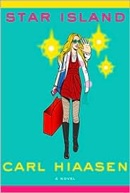 |
Star Island, by Carl Hiaasen I dunno. Carl Hiaasen used to be one of my favorites, but his recent novels seem awfully light. Carl’s schtick is to infuse specificity and detail into an almost endless series of wacky incidents, some plot-related, some thrown in just for fun, like this: “Jack Bogsworth was decapitated in mid-sentence while arguing over his iPhone with a former spouse in the driver’s seat of his 2009 convertible Corvette while driving on Interstate 95 by a flying miniature dachshund which had been furiously flung from the cab of a passing White Freightliner by a one-armed hooker named Maude who’d been picked up by the truck driver at a freeway rest area 50 miles north of Miami, who was angry with the dog for chewing a hole in her knockoff Gucci purse.” The schtick is getting old. As is Hiaasen’s sub-schtick of saddling all but his most sympathetic characters with extraordinary deformities, impediments, and personality disorders. Hiassen’s novels are populated with mental and physical mutants to an extent you would never see outside of an institution. I’m not saying Hiaasen isn’t fun, just that the fun has become inconsequential. It’s probably me. I suspect that if I were to go back and read an earlier Hiaasen novel, one that I particularly enjoyed (like Strip Tease), I’d find it very similar to Star Island — light, contrived, cute, filled with freakish characters. My tastes have changed; I want more meaning. |
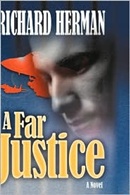 |
A Far Justice, by Richard Herman Full disclosure: the author is a friend. I flew with him at Soesterberg AB in The Netherlands during the late 70s and early 80s, and we’ve remained close ever since. So it’s hard for me to be objective about a Richard Herman novel. But I’ll try. Dick writes about fighter pilots. Fighter pilots at war, fighter pilots in politics; in this case, a retired fighter pilot being prosecuted by the International Criminal Court in The Hague. Dick’s fighter pilots are über-competent, steely-eyed supermen. It verges on hero worship, but when you’re reading a Dick Herman novel you’re all for it. Dick’s enthusiasm is infectious, and his characters, while slightly too good to be true, are engaging. And he tells a hell of a good story. A Far Justice is not only a fun read, it’s educational. When does an individual act of war become a war crime? That is the issue at the heart of this novel, and Dick tackles it with a will. You won’t be disappointed. |
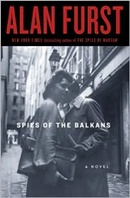 |
Spies of the Balkans, by Alan Furst I love Alan Furst’s noir “Night Soldiers” novels, his series of stories about ordinary men and women doing extraordinary things while fighting the Nazis in wartime Europe. Spies of the Balkans is one of Furst’s best — personal, frightening, suspenseful, and immediate. It has the feel of historical truth, and though you know Costa Zannis is a fictional character, you also know there actually were people like him, doing what they could to frustrate the Germans and, in this case, to help smuggle Jews to neutral countries, far from Hitler’s reach. Furst’s characters have included Soviet NKVD agents, Polish officers, British spies, French bartenders, various painters and writers, ship captains, and now . . . a Greek cop from Macedonia. Furst lives among the gods of espionage fiction: Greene, Ambler, le Carré. Why Hollywood isn’t turning these fascinating stories into movies is beyond me. |
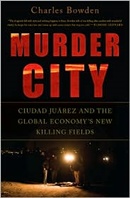 |
Murder City: Ciudad Juarez and the Global Economy’s New Killing Fields, by Charles Bowden Shortly before his death in 2003, Roberto Bolaño finished his novel 2666, about the late-1990s murders of hundreds of women in and around Juarez, Mexico. The murders were shocking then, and remain so. The police were next to useless in solving even a single murder, and to a lesser degree, the murders of women in Juarez continue today. Charles Bowden, writing in 2008 and 2009, carries on with the new round of murders in Juarez, now no longer confined to women but applied seemingly across the board, to men, women, children, police, newspaper reporters, disc jockeys, truck drivers, ice cream salesmen, street sweepers, beggars, addicts, cartel members, retirees and pensioners, night club owners, miscellaneous bystanders, you goddamn name it. It is as if a tide of pure evil has been unloosed on the land, and it’s open season on everyone. The police, as during the murders of the late 1990s, remain useless . . . worse than useless; for in many cases they aid and abet the murderers. The conventional wisdom is that the murders are the result of drug cartel wars and that the federal government in Mexico City is gradually making inroads on the violence, but as Charles Bowden points out, this doesn’t match reality. The violence is increasing day by day, and the murderers, over and over again, turn out to have been committed by members of the Mexican Army, clearly working hand-in-hand with the cartels. When is it not the army carrying out murder, it is gangs, with army and even police support. Part of the problem seems to be a culture of never-ending revenge. Part of the problem seems to be grinding poverty, which has grown worse under NAFTA. Part of the problem seems to be massive government, police, and military corruption. A big part of the problem is that no one is willing to speak out. Not the police, not the Mexican media, not the Mexican population. They are completely cowed. The few who do speak out are invariably murdered themselves. The sheer numbers of murders (upwards now of 1,600 a year in Juarez alone, literally hundreds per month) indicate that something besides drug violence is going on. No one knows whether there is, of even if there is, a single force or reason behind the ongoing murders. It clearly isn’t just drugs. As an atheist, I despair whenever people tell me that only religion and belief in god keep people in line. Here is a people, almost 100% Roman Catholic, murdering each other by the carload. Take your religion; give me atheists any day. Bowden’s book is numbingly repetitive. He catalogs murder after murder, drawing the same non-conclusions (he doesn’t know why, no one knows why) over and over. After a couple of chapters, it drags the reader down. Bowden offers not a single ray of hope, and seems to think the violence has grown to the point where it has taken on a life of its own and is now self-sustaining. Bowden’s reaction is simple despair; that will be your reaction too, dear reader. |
 |
Freedom, by Jonathan Franzen Reading this, my first Jonathan Franzen novel, I was reminded of Phillip Henscher’s The Northern Clemency, another novel about ordinary people (and their children) living out their adult lives from early to late marriage. As Franzen tells the story of Walter and Patty Berglund, he shifts points of view from Walter and Patty’s St. Paul neighbors, to Patty’s autobiographical memoir (written for theraputic purposes), to Walter’s college roommate Richard (best friend & lifelong rival), to the Berglund’s intensely independent son Joey, to an omniscient observer, back to Richard, back to a second memoir written by Patty, and finally back to a new set of neighbors in rural Minnesota. The almost circular symmetry of the narrative structure, in turn, reminds me of David Mitchell’s Cloud Atlas, another novel I loved. Freedom is a big novel (576 pages) about real people living in real times. You will be frustrated with them, sometimes to the point of trying to shout at them through paper and ink because you know they are really there, separated from you only by artificial barrier of the book in your hands, and they might just hear you if you shout loud enough. You will be, along with these strong and unforgettable characters, hopeful, heartbroken, joyful, loving, angry, despairing, depressed, shocked and rocked by the world’s corruption, delighted with its beauties, and finally hopeful again. I’ll stick my neck out and say you will be . . . as I was . . . not just lifted up but exalted at the novel’s ending. This is old school writing. War and Peace old school. I think this novel will become a 21st century classic. |
 |
Dracula, by Bram Stoker This classic came pre-loaded on my Nook, and since I’d never read it I thought I’d give it a go. Written in 1897, the novel feels contemporary in its use of diaries, journals, and letters as a means of telling the story. But the treatment of women — alabaster figurines never far from the fainting couch — is strictly Victorian. I realize now that almost everything I thought knew about vampires was wrong; one could write an entire series of books, à la Harry Potter, based on the extensive vampire lore contained in Bram Stoker’s original novel. I’m glad I finally read this classic. I have just one more thing to say . . . Van Helsing, would you just shut the hell up and do something? |